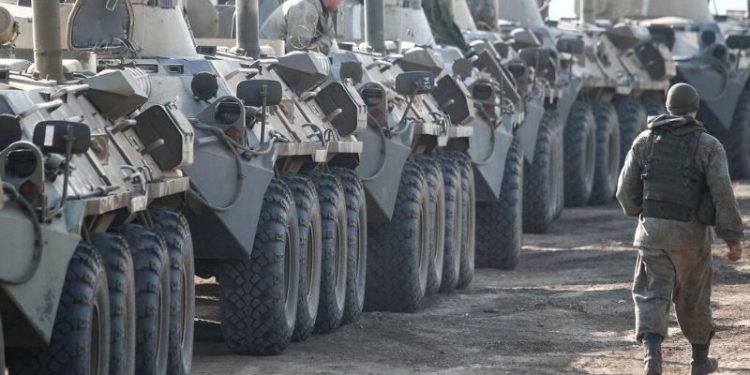In recent weeks, global tensions have soared over the massive deployment of Russian troops around the Ukrainian border in anticipation of Ukraine’s possible accession to NATO.
President Biden and the European Union (EU) have denounced the possibility of a military clash if Russia invades. Are we on the brink of a new regional or world war, or are these political and economic negotiations between Russian and the US imperialism for Ukraine’s control and thus aggravating the situation in the region?
The first thing to note is that, amid the global crisis that the capitalist-imperialist system is experiencing, we cannot deny the hypothesis that an armed confrontation could eventually occur. But we consider that what prevails is hard and crazy bargaining for political and economic influence in Ukraine and the entire region. There is no progressive side to this confrontation.
We see a regional, let alone global, war as the least likely. Although both sides compete in threatening declarations, both are seeking somehow to extricate themselves from the political quagmire they are in. Without making a fool of themselves, as it happened to Biden with his abrupt exit from Afghanistan, and suffering further political wear and tear at home.
The meeting between the US Secretary of State Antony Blinken and Russian Foreign Minister Sergei Lavrov on Friday 21 January, agreeing to meet again in the short term, would show that negotiations are still open.
Putin and Russia’s central demand is that Ukraine, their former ally, should not join NATO. But the background to the crisis is to be found in the collapse of the former USSR.
The USSR collapsed in the 1990s. The fall of the Communist Party dictatorship and capitalist restoration led to the dismemberment of the former USSR, weakening the political and economic power of the new Russian bourgeoisie and the totalitarian regime headed by Putin. Ukraine’s independence in 1991 was a major blow as it was the second-largest economy and breadbasket in the former USSR. Ukraine is one of the world’s major food producers. Since the collapse of the former USSR, European imperialism and the USA launched an offensive to turn the Eastern European countries (Poland, Romania, Bulgaria, Czech Republic, Slovakia and Ukraine) into their semi-colonies.
Until 2014, Russia still controlled Ukraine via the pro-Russian capitalist Yanukovych government. But the precipitous fall in the living standards of the working people because of capitalist restoration led to a popular rebellion that overthrew Putin’s allied government and impose one in agreement with European imperialism.
Putin’s reaction to this defeat was to invade Crimea, Ukrainian territory, and take over the historic naval base of Sevastopol at the strategic entrance to the Black Sea. In 2014, Putin also instigated separatist uprisings in the Donbas region, east of the country. They continue to control that region with financial and arms support from Russia. The conflict has been simmering ever since.
Why is Putin now coming out with this counter-offensive? Because the global capitalist economic crisis is also affecting him politically and economically. Russian imperialism has been weakened, beset by various conflicts. First, Russia’s austerity policies, combined with the consequences of the COVID-19 pandemic and repression, has worn down its government, reflected in a setback in the last elections. Second, it has had to prop up pro-Russian governments by intervening, directly or indirectly, with troops, in the popular rebellions in Belarus and, recently, in Kazakhstan. That is why he wants to revive the Ukraine crisis, taking advantage of its possible accession to NATO, to win back power by stoking Russian nationalist sentiments among broad sections of his social base. In addition, Putin wants to negotiate better conditions for the prices of Russian gas going to Europe and the building of new pipelines.
The US and European imperialism have served Putin the argument on a plate with their offensive to make Ukraine part of NATO, the most important imperialist military alliance. Biden and the EU are thus seeking to consolidate their control and domination over Ukraine and the whole of Eastern Europe. This policy is being taken up by the present capitalist government of Ukraine, which continues to exploit its working people in alliance with the multinationals.
In this clash between Russia, the EU and Biden, there is nothing progressive. It is an inter-bourgeois fight to cushion the political and economic crisis suffered by each of these imperialist powers. China and Iran have given lukewarm backing to Putin’s demand. And Putin, among his bluster, threatened to send military forces to Cuba and Venezuela.
Although the IWU-FI considers it unlikely that this crisis will end in a major armed clash and that the focus of Biden and Putin is to reach a negotiated agreement, we cannot rule out an armed clash. Even more so when both sides continue to build up troops and armaments.
Faced with this possibility, from the IWU-FI, we call to repudiate any attempt or threat by Russia-Putin to invade Ukraine, and to demand: No interference in Ukraine by Russian imperialism and by European imperialism and the USA; No NATO in Ukraine; immediate withdrawal of all nuclear weapons and missiles from Russia and NATO; For the self-determination of the Ukrainian people.
The fundamental way out of this crisis is for the working class in Russia and Ukraine to confront their governments and impose workers’ governments.
International Workers’ Unity-Fourth International (IWU-FI)
24 January 2022













